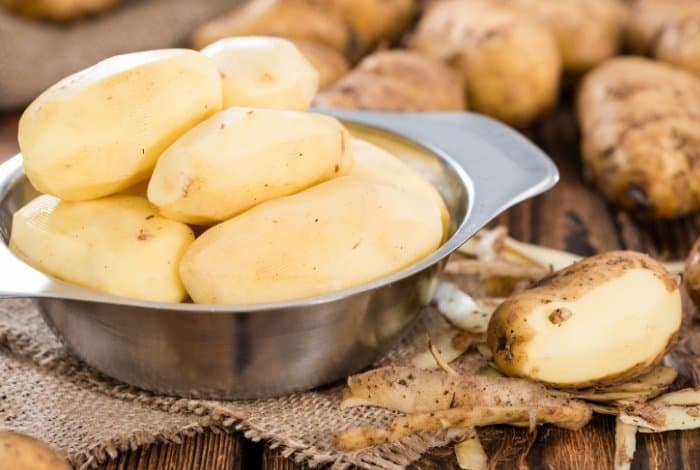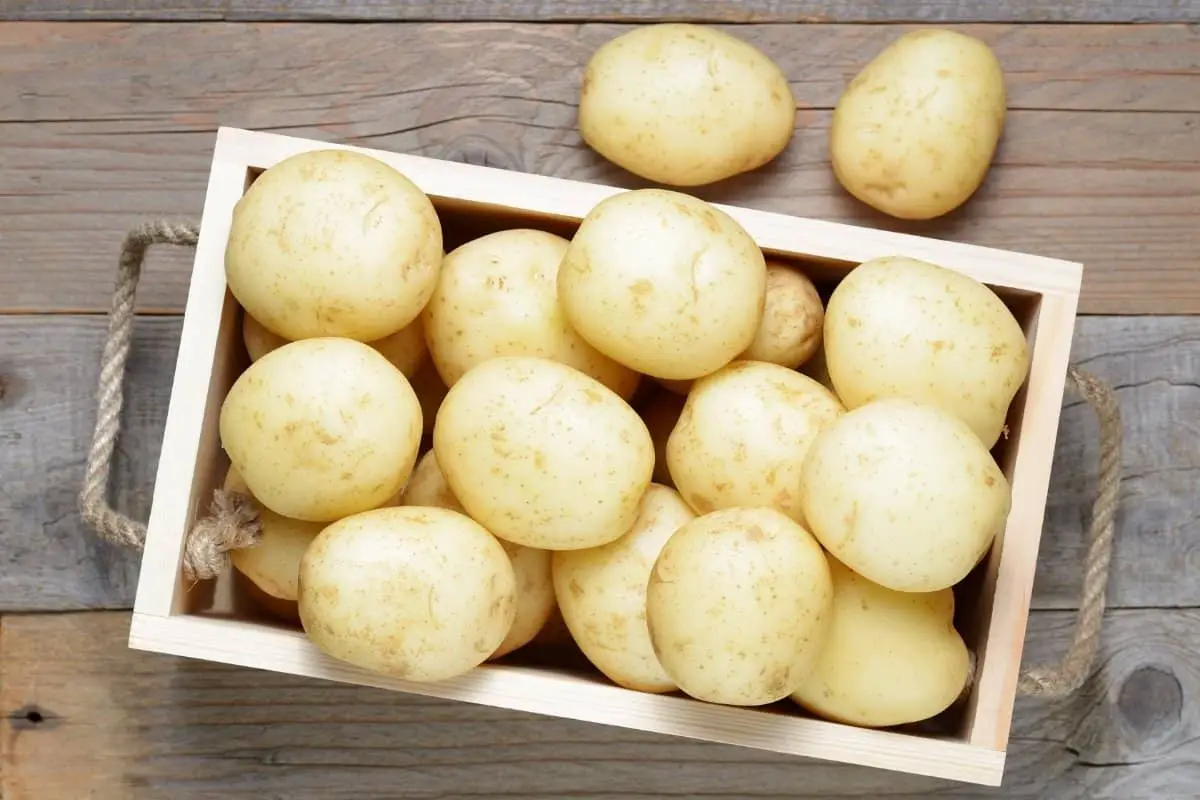Last Updated on December 28, 2021 by
It is critical to learn how to store potatoes from the garden after all the hard work of growing and harvesting them. Or maybe after buying farm-fresh potatoes in bulk from the local farmers market.
If you leave your fresh potatoes on the kitchen counter, they will quickly start to sprout. Should you want to savor your produce to last longer and remain fresh you will take a few necessary steps.
The first and the most important is to allow the potatoes to grow for a longer period than normal. Keep them at least two more weeks past their harvest date. This will make their skins harden up and the fresh taste from harvest lost. Remember not to water them during these two weeks!
Preparing Harvested Potatoes For Storage
Sort out the Freshly Harvested Potatoes – The first step after harvesting potatoes is to sort through them. Sorting separates the best ones suited for storage from the rotten or bruised. Consume the bruised potatoes should first and do not store them at all.
Clean the Potatoes before Storing Them – If your potatoes do not have much soil, brush off the soil with a soft brush. Or place them on a cardboard box for a day or so to remove all the soil. If the soil is sticky, give your potatoes a few more days for the sticky soil to dry and scrub it off with a soft brush. Avoid washing your potatoes before storing them. Wash them lightly only if need be and allow them to completely dry.
Cure the Potatoes
Curing is a process that toughens up the potatoes further. Place the potatoes where there is a moderate temperature for about 10 days. After the spuds have cured, check them for any damage or rot. Remove any potatoes that have soft spots or green ends.
Store the Cured Potatoes – Store your cured potatoes in a cool environment for long term use. Choose a dry darkroom to store them within a temperature of 35 to 40 degrees Fahrenheit.
Several Ways Of How To Store Potatoes From The Garden
There is more than one way to store potatoes. Here are some steps you can try to work with until you find the best that suits you.
Store in a Container that allows Good Ventilation
A cardboard box or laundry basket is an excellent choice for storing cured potatoes. Avoid the use of plastic bags because it leads to moisture retention. Cover the box or container you choose to use to prevent light exposure. Make some ventilation holes if necessary. Be sure to check them every few weeks to remove any soft, rotten, or sprouted potato.
Golden Nature Bamboo Fruit Basket
Read more about When is Sweet Corn Ready to Pick
Rebury the Potatoes in the Soil
If you only want to preserve your potatoes through the late fall, use a simple preservation method. Put the potatoes back into the soil after harvesting them to preserve them. Dig broad trenches about 6 inches deep and place the potatoes on the bottom. Cover them with straw, loose soil, or several folds of the newspaper. This protects them from extra wetness from the rain. The potatoes stay fresh until you dig them up in the fall.
Blanche the Potatoes for Freezer Storage
If you have adequate spaces in your freezer why not store your produce. Frozen potatoes can last a year or longer. Peel your potatoes and put them in cold water making sure they are submerged so they don’t turn brown. Slice them in equal parts to ensure they will cook evenly. Rinse the potatoes and put them in a pot of boiling water to blanch for 3 to 5 minutes depending on their size. Remove them and plunge them in ice-cold water to stop the cooking process. Drain the potatoes once cool and put them in freezer bags. Use a vacuum sealer to seal to ensure no air moves in and out. When ready to cook them, remove them from the freezer, allow them to defrost, and cook as usual. You will get a better texture if you defrost in the fridge rather than the microwave.
Learn more about The Ultimate List of Determinate and Indeterminate Potatoes
Pressure-can Potatoes
This is one of the easiest ways of how to store potatoes from the garden for the long term. Pressure canning is not reliant on refrigeration. You’ll need to use a pressure canner because it is safe for storage. You need quart-sized mason jars and salt to use in storage. Peel the potatoes and remove any eyes before chopping into halves. Place them in water-filled bowls and blanch for three to five minutes. Drain the potatoes and rinse them to remove the starch before putting them into sterilized mason jars. Fill them with hot water leaving only an inch of the headspace. Add a teaspoon of salt per quart for preservation. Wipe the rims before placing the clean lids and rings. Pressure can at 10 pounds of pressure for forty minutes.

Conclusion
Potatoes are a delicacy all year round! You cannot afford to not have them in your kitchen. You will appreciate the efforts to store your potatoes because that means you can enjoy them for longer!
FAQs
How do you store freshly dug potatoes?
Potatoes are a staple food item for many people. They are usually stored in a cool and dark place until the day they are cooked with. But what happens when you have to store them immediately after digging? People may not know this, but storing freshly dug potatoes is not as easy as they think.
Potatoes must be kept dry, as wet potatoes will turn brown. You can also wrap them in paper or plastic bags, or place them in a closed container with an oxygen absorber inside.
There is no need to refrigerate freshly dug potatoes, as they do not contain any bacteria that can grow if stored at low temperatures
Here are some tips on how to store freshly dug potatoes.
Tip #1: Sprinkle them with salt and arrange them in a container with a lid
Tip #2: Cover potatoes loosely with layers of newspaper or paper towel and then cover that layer with another large container or box
What is the best way to store potatoes long-term?
This is a question that many people have been asking themselves particularly with the recent weather. They want to know what is the best way to store potatoes long-term? One method is to store them in a cool, dark room that has high humidity. Another way would be to place them in a bag with lime and cover it in tinfoil.
Unfortunately, there is no one-size-fits-all answer for potato storage. There are lots of factors that play into the best way to store potatoes: size, climate, variety of potatoes, etc. In the end, it all comes down to personal preference and what you have available for your own storage needs.
Potatoes are a delicate vegetable, and storing them is essential for keeping them fresh for as long as possible. Over time, potatoes can get damaged because of their natural oils that can turn rancid and cause the potato to shrivel up. This is what you want to consider when thinking about different storage routes.
How do you store potatoes so they don't sprout?
To avoid this from happening, it is important not to cover them up and keep them in an airy space with cool temperatures.
A bag or basket of potatoes will cause some of the potatoes to sprout because they are not exposed to sunlight. The next best option would be keeping them in a cool, dark place without any covering material. While you can use a plastic bag, some people prefer using their kitchen sinks because they are airy and cool enough for storing potatoes without causing any problems
Storing potatoes upright prevents them from absorbing moisture and lessens their chances of growing into sprouts that can make your food go bad.
Should you wash potatoes before storing?
Some people believe that you should wash potatoes before storing them. Others say it is not necessary because they are going to be stored for a long time anyways.
The answer to the question is no, you shouldn't wash your potatoes before storing them. When you wash potatoes, the starch that gives them their potato flavor is also removed and replaced with water. This is why we don't recommend washing potatoes before storing.
Potatoes are best stored in a cool, dark place in a sealed bag or container. You can store them in your pantry or refrigerator and they should last for up to six months.
Caroline is a gardener who loves to get down to the nitty–gritty of gardening. She proudly proclaims herself as a ‘dirt worshipper‘ and can often be found deep in the garden, covered in soil and singing to her plants. As a self–proclaimed ‘plant whisperer‘, Caroline believes that plants need love and attention just like any other living thing, and she loves to give them both. When she‘s not tending to her garden, you can often find her researching the latest gardening trends, or teaching others how to make their gardens thrive



